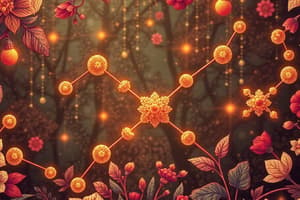Podcast
Questions and Answers
What is the primary element found in compounds studied in organic chemistry?
What is the primary element found in compounds studied in organic chemistry?
- Nitrogen
- Carbon (correct)
- Oxygen
- Hydrogen
Which molecule is mentioned in the text as playing a crucial role in photosynthesis?
Which molecule is mentioned in the text as playing a crucial role in photosynthesis?
- Water (H₂O)
- Chlorophyll (C₅H₇MgN₄O₄) (correct)
- Methane (CH₄)
- Carbon dioxide (CO₂)
What is an example of an essential organic transformation described in the text?
What is an example of an essential organic transformation described in the text?
- Alkane combustion
- Neutralization reaction
- Electrophilic aromatic substitution (correct)
- Hydrolysis of salts
What is the main focus of organic chemists when studying chemical structures?
What is the main focus of organic chemists when studying chemical structures?
What do functional groups represent in organic chemistry?
What do functional groups represent in organic chemistry?
What are some commonly encountered functional groups in organic chemistry?
What are some commonly encountered functional groups in organic chemistry?
Which synthetic methodology is known for forming carbon-carbon bonds through the reaction of a metal halide with an alkyl halide?
Which synthetic methodology is known for forming carbon-carbon bonds through the reaction of a metal halide with an alkyl halide?
In organic chemistry, what functional group contains a carbon-oxygen double bond?
In organic chemistry, what functional group contains a carbon-oxygen double bond?
Which area benefits significantly from organic chemistry in terms of pharmaceutical discovery?
Which area benefits significantly from organic chemistry in terms of pharmaceutical discovery?
What is a key focus of green chemistry initiatives in the context of organic synthesis?
What is a key focus of green chemistry initiatives in the context of organic synthesis?
Study Notes
Exploring Organic Chemistry's Fascinating World
Organic chemistry is a branch of chemistry dealing with compounds containing carbon atoms primarily found in living organisms. This field has profound effects on our daily lives, from pharmaceuticals and food production to materials science and environmental concerns. Here we delve into some key concepts and applications of organic chemistry.
Structural Diversity
The scope of organic chemistry encompasses a vast number of chemical structures ranging from simple hydrocarbon chains like methane (CH₄) all the way up to complex molecules such as chlorophyll (C₅H₇MgN₄O₄), which plays a crucial role in photosynthesis. Organic chemists study these structures to better understand their properties and reactivity, enabling them to synthesize new, useful compounds.
Reactions and Mechanisms
One of the most fascinating aspects of organic chemistry lies within its reactions and mechanisms. Organic chemists explore reactions that build bonds between carbon atoms and other elements, analyzing reaction pathways and understanding how certain functional groups can influence reactivity. For instance, electrophilic aromatic substitution – where an electron-rich ring reacts with an electrophile to form a covalent bond – is a classic example of an essential organic transformation.
Functional Groups
Functional groups serve as specific parts of a molecule responsible for unique chemical behavior. Commonly encountered functional groups in organic chemistry include alkyl halides (-X) derived from hydrocarbons, alcohols (R-OH), ethers (R-OR'), carboxylic acids (RCOOH), amines (NR₂, NHR), carbonyls (C=O), and double bonds (C=C). These functional groups allow chemists to tailor molecular properties according to targeted applications.
Synthetic Methodologies
Organic chemists aim to develop efficient synthetic methods to construct target compounds from simpler starting materials. Some well-known methodologies include Friedel–Crafts reactions, Grignard reagent syntheses, Wittig olefination, and Stille couplings. Each offers distinct advantages based on the desired outcome and can facilitate the formation of various structural motifs.
Applications
The practical implications of organic chemistry are diverse and broad-ranging. Pharmaceutical discovery relies heavily on this discipline, leading to the development of life-saving medications like aspirin and penicillins. Other industrial sectors benefit significantly too; examples include polymers, plastics, dyes, flavors, fragrances, and even fuels. Furthermore, green chemistry initiatives foster innovative strategies within organic synthesis, promoting more sustainable processes while reducing waste generation and environmental impact.
In conclusion, organic chemistry is a dynamic, engaging subject with abundant opportunities for exploration and innovation. Its fundamental principles drive advances across numerous industries, ultimately improving quality of life through novel discoveries.
Studying That Suits You
Use AI to generate personalized quizzes and flashcards to suit your learning preferences.
Description
Test your knowledge on key concepts and applications within the fascinating world of organic chemistry. From structural diversity to reactions, mechanisms, functional groups, synthetic methodologies, and practical applications, this quiz covers various aspects of this crucial scientific field.




